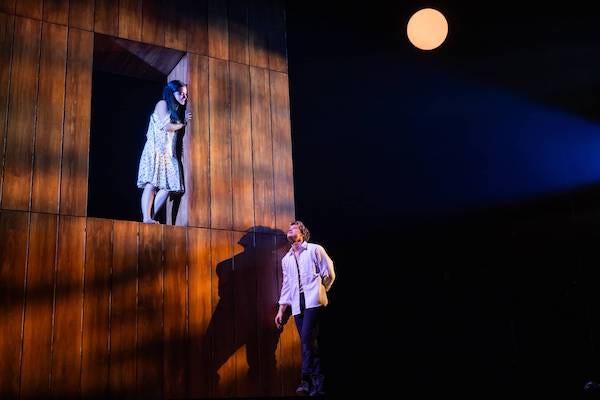The Arts Fuse Newsletter, September 18
Coming Attractions, A.R.T.'s "Romeo and Juliet." Moon Unit Zappa's memoir, the Music of Michael Tilson Thomas, and SpeakEasy Stage's "Laughs in Spanish"
From The Editor's Desk:
In an arts review, who is “we”? That question popped into my head while reading the Boston Globe’s favorable review of the American Repertory Theater’s production of Romeo and Juliet. Here is one instance: “By the second half, when his joy about catching up on news of Verona turns to crushing despair, [Rudy] Pankow is fully invested in this young man and we ache with him. And when he kisses his wife in the tomb where she rests, we, too, are devastated by the depth of his loss.” Who is this “we” who can’t help but “ache” and then be “devastated”? If it is A.R.T. audience members, the answer is obvious – somehow the reviewer has sensed a unanimous reaction. Via a telepathic link with theatergoers? A post-show poll? Might there not be exceptions? I, for one, was not “devastated” by Romeo’s grief over the death of Juliet in this staging. Moved, yes, but not to an extreme. Isn’t it somewhat arrogant — perhaps a bit dangerous — for a critic to posit what spectators feel, particularly given that theater audiences are becoming increasingly diverse?
In the past, “we” has been used by critics as a rhetorical cudgel. The implication is that if you are not part of “we” — the right-emoting group — your response is limited, subpar. In her film reviews, Pauline Kael was a master of this kind of high-handed bullying, asserting what “we” should feel as a way of dividing the hip sheep from the square goats. After attending a screening of the film Shoeshine, Kael proudly wrote about loudly challenging a woman as she left the theater. Why didn’t she cry at the end? What was wrong with her? The chutzpah it takes to announce what audiences feel can degenerate into an arrogant suggestion that it is how they should feel.
The point is, when it comes to arts criticism, there is no strength in numbers. The critic makes an individual judgment, and goes on to persuade the reader, through evidence and analysis, of the power of their verdict. Bringing in “we” negates that responsibility because it neglects that task. The reviewer’s duty is to articulate how the actor or scene generated the emotions they did — to the critic — not to reduce evaluation to a proclamation that “we” all feel the same thing. Placing the emphasis on “I,” rather than “we,” is an elementary rule in professionally reviewing the arts. Understandably, the Boston Globe’s editors and critics are a tad rusty, given that the newspaper is running fewer reviews and more features.
—Bill Marx, Editor-in-Chief
Note: From the Editor's Desk -- By Popular Demand.
Readers have asked that I post these weekly opinion pieces in the magazine — request granted.
Coming Attractions Through September 30 — What Will Light Your Fire
Compiled by Arts Fuse Editor
Our expert critics supply a guide to film, visual art, theater, author readings, and music. More offerings will be added as they come in.
Theater Review: A.R.T.’s “Romeo and Juliet” — What’s Love Got to Do With It?
By Bill Marx

Cinematic in inspiration, Diane Paulus’s direction whips up terse bursts of adolescent energy, tapping into a cocky hunger for self-destructive combat.
Book Review: Moon Unit’s “Earth to Moon” –A New Age Quest for Healing
By Trevor Fairbrother
Moon Unit devotes less than a quarter of her book to the three decades since her father’s death. Despite his failings as a parent, she wants to respect Frank Zappa’s stature as an artist
Classical Album Review: “Grace” — The Music of Conductor Michael Tilson Thomas
By Jonathan Blumhofer
This album fills out Michael Tilson Thomas’s compositional catalogue, deepening our appreciation of it. More fundamentally, it adds meaningfully to the story of American concert music.
Theater Review: “Laughs in Spanish” — The Art of the Heart
By Robert Israel

Is it possible for an outstanding actress to achieve similar heights as a playwright? The answer is yes, but with reservations.
Television Review: “Uglies” — Is This Dystopia Really Necessary?
By Sarah Osman
By not giving the material a refreshing 21st-century update, the film version of Uglies comes off as an unattractive antique.
Help Keep The Arts Fuse Lit!
Precious few independent online arts publications make it to double digits. Please give us the resources the magazine needs to persevere at an essential cultural task.
Keep the Fuse lit and support our 70+ writers by making a donation.
The Arts Fuse also needs underwriting for the magazine to continue to grow.
And…tell your friends about the in-depth arts coverage you can’t get anywhere else.
Questions, comments, concerns?
Editor-in-Chief
Bill Marx
wmarx103@gmail.com










